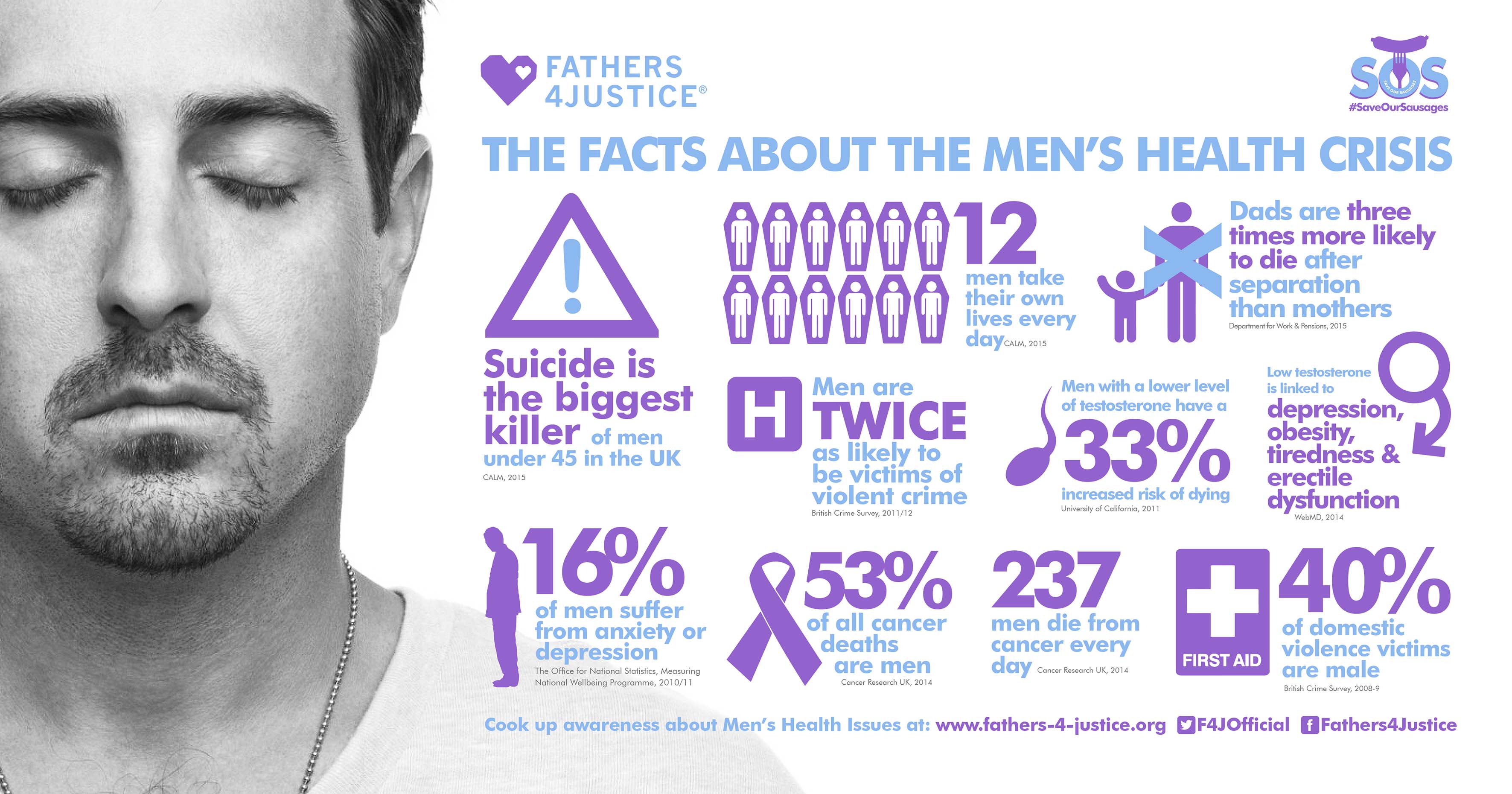The Sun: ‘For too long the men’s health crisis has been taboo’
To mark International Men’s Day, we highlight the tell-tale signs your man is reaching breaking point – and highlight some of the possible causes behind it.
Needless to say, these problems can affect any man at any age.
Something Matt O’Connor, founder of Fathers4Justice, knows all too well.
He suffered depression when his family life fell apart and he was alienated from his sons. Sadly, despite being at a high risk of suicide, there was little support in place for him. An experience that’s still all too familiar for millions of men.
Speaking to The Sun, he said: “Ian Duncan-Smith once told me that men’s issues had become a ‘political taboo’ amongst politicians desperate to appeal to who they believe are the largest constituency of floating voters – single mothers.
“By way of distraction, consecutive governments have demonised dads as ‘deadbeats’ and reduced them to the status of cashpoints and sperm banks, whilst denying them equal parenting rights.
“Tens of thousands of men have been washed up and disenfranchised which is part of the reason why they are choosing death, rather than life.”
Fortunately, since 2014, Fathers4Justice have been calling for a Minister for Men & Boys to give them an equal voice in government.
“We need someone to coordinate a response to the public health emergency facing men; a plague of fatherlessness and a suicide epidemic which is devastating families across our country,” he adds.
“For too long the men’s health crisis has been taboo – in part because people won’t address the issues behind it, but we need to break the wall of silence and address these problems without censorship.
“If we don’t, they’ll only get worse.”
If there’s any doubt over the need for International Men’s Day, the fact 4,500 blokes kill themselves each year should convince even the biggest of cynics.
Especially when that number means roughly 12 men – all brothers, fathers, sons and uncles – needlessly end their lives every single day.
Worryingly, as the charity CALM will attest, the numbers are at a 15-year high and show no sign of slowing down. But, although it’s tragic, is this really so surprising?
After all, there’s actually plenty for men to be depressed about. As the Office for National Statistics state, men don’t just lead women in nine of the top 10 killer diseases, including heart disease, stroke, pneumonia, diabetes and cirrhosis of the liver – you know, the really fun ones – we also die five years earlier than women, as part of a life expectancy gap that’s swollen 400 per cent in 90 years.
Despite this, Chief Medical Officer, Sally Davies, has yet to express any intent on a men’s health report – even though she conducted one on women, earlier this year.
In addition, we also still don’t have equal parenting rights, we’ve been allowed to fall behind in education, remain the majority of the unemployed and are the bulk of the prison population. Despite all this, we still don’t have a men’s Minister or any real champion.
Which is precisely why it’s important for IMD to tackle the root of the problem – not just the symptoms, such as depression and male suicide, as so often happens.
That said, recognising the warning signs can literally be a matter of life or death.
So, in honour of today, here’s a quick five-point guide to some of men’s most common warning signs.
1. Self-medicating with drink or drugs
Both genders can turn to the bottle – or worse – when stress reaches fever pitch, but men are far more likely to use drugs and alcohol when dealing with their feelings.
Naturally, there’s a difference between consuming for fun and those who seek oblivion, so look out for the grey area in between.
Often, somebody who’s depressed won’t consciously know he’s doing it, so you’ll probably spot the signs first.
As a barometer, remember: men are advised by the Chief Medical Officer not to consume more than 14 units of booze per week – that’s either six pints of beer, six glasses of wine or 14 spirit shorts (25ml).
They also recommend two drink-free days each week.
Some excess has no dysfunction behind it, of course – especially at this time of year. But they key is to know what’s normal for him.
For more information visit: Drink Aware or Frank.
2. Too much – or too little – sleep
We all enjoy a lie-in sometimes. Especially given that life is demanding from the moment we wake up.
But a nagging, seemingly-endless fatigue can be a red flag for something a little more sinister – especially in men who are young enough to have decent energy levels.
As noted by CALM, low drive, finding it hard to do anything and a frequent need to sleep can indicate depression as much as its opposite: insomnia.
Fix or six hours of shut-eye should be the minimum for any adult, but experts also say that we should cap it at nine hours per night.
Not least because it has other consequences, medics claim. A recent study found that too much kip can almost halve a blokes fertility.
Doctors say going beyond the nine-hour rule can reduce fertility by more than 40 per cent because of the male hormone testosterone, which is released into the body during slumber.
3. Anger
It’s easy to demonise a man’s anger – even if its directed at nobody other than himself.
However, as a natural reaction to life’s challenges, it often relates to something much deeper beyond the surface – something we can’t see, but he certainly feels.
As noted by CALM, this means a man who’s suffering is not simply an irrational person or brute, but that he needs help.
Likewise, the genders are different, so while women may cry when they feel depressed, men – who have much more action-triggering testosterone in their system – will often become irritable and belligerent when upset or down.
This is normal, but it’s still a symptom of a bigger issue, so keep an eye on this – even if it doesn’t manifest in anything other than him getting a tight chest, tense muscles, weak legs, and hot or sweaty in response to upset.
4. Lack of interest in sex
It doesn’t need saying that most men love sex.
Flick through any men’s magazine and there’s plenty of proof of our nature-instilled mating instinct. But, when stress or depression strikes, sex drive can be one of the first things to go AWOL.
As noted by NHS Direct, loss of libido is a common problem affecting up to one in five men at some point in their life.
It’s often linked to professional and personal stress, or important life-changing events such as pregnancy, childbirth or breastfeeding.
However, an unexpected loss of libido – especially when it lasts for a long time or keeps returning – can also indicate an underlying personal, medical or lifestyle problem, which can be upsetting to both partners in a relationship.
If this happens on occasion, it’s no big deal, but anything else should be monitored.
5. Comfort eating or loss of appetite
Just like men are prone to self-medicating with alcohol and illegal drugs, they can also turn to comfort in food thanks to its endorphin-releasing properties.
Typically, eating disorders are perceived to be conditions that affect only women – but this is far from the case.
On the contrary, charity MGEDT (Men Get Eating Disorders Too) report that between 10 and 25 per cent of those experiencing eating disorders are male.
The majority of whom struggle to get access to appropriate support and treatment, so much goes on under the radar.
Therefore, it can be easy to assume assume that a man eating too much – or too little – is nothing to be concerned about.
But, in reality, it’s a red flag and is sometimes a sign of self-sabotage.



